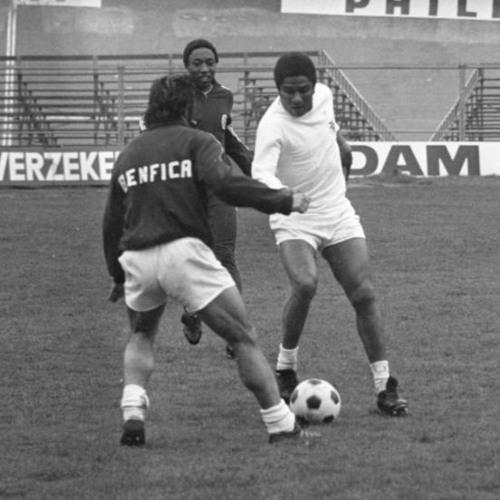
Submitted by Administrator on Wed, 02/12/2015 - 10:19
The life of Portuguese sporting legend Eusebio, renowned as the top scorer in the 1966 World Cup, is discussed in a new podcast, which explores his early struggles with colonialism in his home country of Mozambique.
The life and career of 1960s footballing legend Eusebio da Silva Ferreira, known simply as Eusebio, is celebrated in the latest episode of the podcast Cold War Sports History, available to listen to free online.
Eusebio, who was born in Mozambique in 1942 and died in 2014 aged 71, has been described as “one of the greatest footballers of all time”. From his early life in extreme poverty, where he played barefoot in the streets of what was then a Portuguese colony, to his rise to stardom as one of the world’s top scorers, Eusebio’s career was a reflection of his incredible sporting talent.
Despite his phenomenal ability as a world-class footballer for Portugal – top scorer in the famous 1966 World Cup – Mozambique-born Eusebio can be seen as one example among many of African talent being mined for the benefit of a European colonial power.
In conversation with podcast host Vince Hunt, African history expert Todd Cleveland of the University of Arkansas revealed how players from Portuguese colonies such as Mozambique and Angola were cherry-picked by clubs in Portugal and brought to Europe. It was a journey that could lead to freedom from the poverty of the African colonies, but one which also brought its own challenges.
“Mozambique didn’t really have a national side at the time: it was a colony”, said Cleveland. “Eusebio and this whole group of players had to face acute social challenges going thousands of miles away into a largely alien environment. They had to take boats from Africa and it took a month to arrive in the capital. Some of them stayed, others went north to Porto, and others went into the sparsely populated interior. Many of them never made it”.
“If they didn’t succeed as footballers they were required to go back to the colonies”, Cleveland said. “There was no room for them to stay and work or go to college. They were forced to return to their colonial settings”.
One striking episode from Eusebio’s life is that of him leaving the field at Wembley in tears following Portugal’s crushing 2-1 World Cup semi-final defeat to England in 1966.
“What’s interesting is that he’s commiserating with a white Portuguese member of the team”, said Cleveland. “It suggests co-operation and camaraderie that transcends race, which is incongruent with our understanding of the colonial period at the time, when wars were being fought for independence in Mozambique, Angola and Guinea”.
“Eusebio generated a sense of Mozambican nationalism, though for the most part the players didn’t want to get involved in the politics of the day”, Cleveland said. “Eusebio was very apolitical as were many of the Portuguese players; in sharp contrast to the Francophone African players who came to France and got very involved in politics”.
Ranked number nine in FIFA’s list of the greatest footballers of all time, Eusebio was one of the most successful African players in mid-1960s Europe. Beginning at a Sporting Lisbon “nursery club”, he was signed by Primeira Liga team Benefica in 1961, at the age of 19.
Over the next 15 years, Eusebio helped them to ten League Championships and scored twice in their 5-3 victory in the 1962 European Cup Final, defeating a legendary Real Madrid side featuring di Stefano and Puskas, who had scored a first half hat-trick. Eusebio made 64 international appearances for Portugal, and ended his career with a stunning 733 goals from 745 professional matches.
The Cold War Sports History podcast series brings together academics and experts from around the world to discuss how sport was at the forefront of social and political conflicts during the Cold War. The podcast is part of a Cold War History project run by Professor Chris Young of Cambridge University and Professor Bob Edelman from the University of California, San Diego, in collaboration with the Washington DC based Wilson Center.
The podcasts look deeper into how sport became a political frontier during the tense and hostile times of the Cold War, and how sporting events became showdowns, opportunities to display national strength, and even propaganda wars involving surveillance, doping and dirty tricks.
Professor Chris Young said: “The closer our focus on sport during the Cold War period, the more complex the picture. Eusebio is perhaps the most famous of the African footballers involved in this colonial sporting route and offers us a way of looking at that process, but it’s clear that race is a significant and under-estimated issue in Cold War politics”.
Launched in October this year, the series has already looked at topics such as how Stasi support for Berliner FC affected East German domestic football, how John F. Kennedy demanded answers to poor ice hockey performances by the 1963 US team, and how Cold War tensions played out in films such as Rocky IV.
Podcast host Vince Hunt is an independent journalist and documentary maker who has won several awards for his programmes for the BBC.
All of the Cold War Sports History podcasts can be listened to and downloaded for free online at http://digitalarchive.wilsoncenter.org/theme/sport-in-the-cold-war/resources.
The podcast is also available on iTunes and Soundcloud.
This episode can be heard and downloaded via the University of Cambridge Soundcloud.
Also published in the Cambridge News, 10/12/2015.
